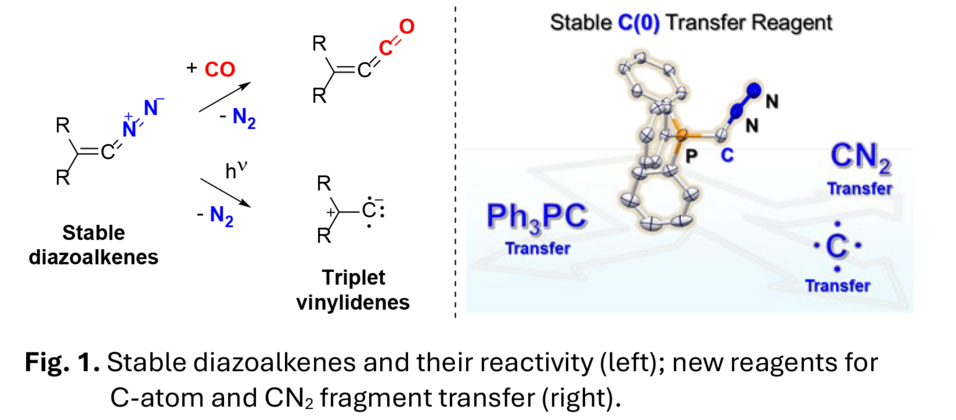Prof. Dr. Max M. Hansmann, TU Dortmund, Fakultät für Chemie und Chemische Biologie, Organische Chemie, Germany
"From reactive intermediates to novel reagents for C-atom transfer"
This talk will discuss how polarization of a C–C bond can lead to the stabilization of reactive intermediates such as stable diazoalkenes. Diazoalkenes have been postulated in a series of important reactions such as the Seyferth-Gilbert homologation. While the direct evidence for their existence in these transformations remains missing, their spectroscopic identification was so far limited to matrix-isolation studies at low temperatures. Conceptionally, we demonstrate that diazoalkenes can be tuned to room temperature stable compounds.[1] The synthesis, characterization, electronic structure and reactivity of the discovered stable diazoalkenes is presented.[1] Stable diazoalkenes allow to engage in N2/CO exchange reactions[2] or can be used as precursors for triplet vinylidenes.[3] Based on our discoveries with unsaturated diazo compounds the generation of new reagents for C and CN2 transfer are presented.[4] The design of new reagents for the transfer of C-atoms in organic chemistry will be discussed.[5]
References
[1] P. W. Antoni, C. Golz, J. J. Holstein, D. A. Pantazis, M. M. Hansmann, Nat. Chem. 2021, 13, 587–593.
[2] P. W. Antoni, J. Reitz, M. M. Hansmann, J. Am. Chem. Soc. 2021, 143, 12878–12885.
[3] Y. Kutin, J. Reitz, P. W. Antoni, A. Savitsky, D. A. Pantazis, M. Kasanmascheff, M. M. Hansmann, J. Am. Chem. Soc. 2021, 143, 21410–21415.
[4] T. Koike, J.-K. Yu, M. M. Hansmann, Science 2024, 385, 305–311.
[5] Q. Sun, J.-N. Belting, J. Hauda, D. Tymann, P. W. Antoni, R. Goddard, M. M. Hansmann, 2025, unpublished results.

